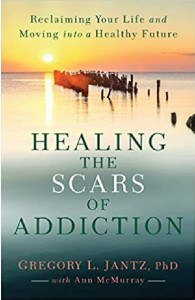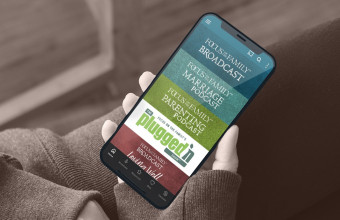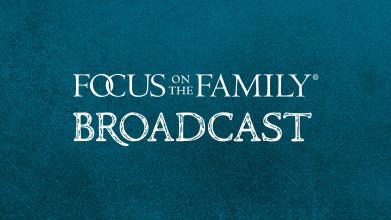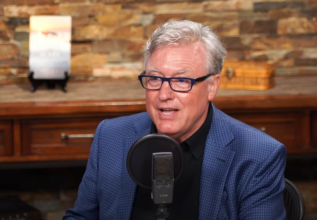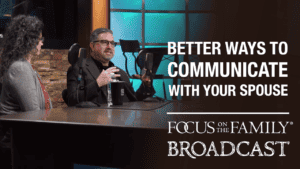Preview:
Dr. Gregory Jantz: Nobody ever starts out saying, “Hey, I wanna be an addict.” It doesn’t work that way. You know, it’s like the person, “Well, yeah, I wanted to be an alcoholic.” No. Addiction is two things. It’s subtle and it’s sneaky, and then it gets a strong hold.
End of Preview
John Fuller: Dr. Greg Jantz is our guest again today on Focus on the Family, offering, uh, hope to those who are addicted. You can find freedom in Christ. Your host is Focus president and author Jim Daly, and I’m John Fuller.
Jim Daly: If you missed last time, get the smartphone app, or go to the website at Focus on the Family to, uh, get the download. We wanna get that into your hands. We covered some amazing material and encouragement for those who are addicted or thinking they might be addicted. In addition to all that, uh, we have caring Christian counselors here to help. And I wanna make sure we say that right from the start. Uh, last time we talked with Dr. Jantz, uh, he defined for us what addictions are, and helped us to identify those addictions we might, uh, be experiencing, and maybe not even know, really.
John: Mm-hmm.
Jim: Whether that’s an eating addiction, that one cuts kinda close. I do enjoy a hamburger.
John: (laughs)
Jim: Probably too often. And, uh, you know, that is a problem. Eating can be an addiction. All the way down to the classic addictions of alcoholism and drug abuse and pornography. And here’s the point. You might be saying, “Wait a minute. I’m listening to a Christian station. I’m listening to Focus on the Family.” I’ll tell you, the church has almost as much difficulty with addictions as the world. But there is something tremendous about our way out, a relationship with Jesus Christ. And man, that is so critical in giving you the ability to understand who you are in Christ, and the ability to come out of this pit of addiction.
John: Mm-hmm. And, uh, beyond the counseling that you mentioned, Jim, we also have, uh, this book, this great book, that Dr. Jantz wrote, called Healing the Scars of Addiction. Uh, stop by our website or give us a call for your copy, or to talk to one of our counselors. Our number is 800-A-FAMILY. And online we’re at focusonthefamily.com/broadcast.
Jim: Greg, welcome back to Focus on the Family.
Dr. Jantz: I am so glad we can talk about part two of addiction, ’cause there’s so much to say.
Jim: There is. And, uh, I think a good place to start will be a little of a- a comment that we, uh, talked about last time. And we didn’t call it this, but it is what it is, and that is the gorilla that some people are confronting. Uh, how do you know you’re addicted, and what do you do?
Dr. Jantz: Well, one of the things, you know you’re addicted, first of all, you’re trying to keep things secret. So addiction thrives on deception. So I’m deceiving other people, and ultimately I’m deceiving myself. One of the things that I just recently heard from a pastor who came to get some help, he said, “I wish I wouldn’t have waited so long.” You see, addiction causes you to be afraid. It causes you not to feel like I can do anything else. Addiction lies to you. It says, “I can handle this. This is no big deal.” And addiction doesn’t tell you the truth. It creates a non-reality.
Jim: Yeah, and, but it raises the point. You try to believe you- you’re a rational person-
Dr. Jantz: Yeah.
Jim: … and that you would not self-harm, especially as believers.
Dr. Jantz: Right.
Jim: You know, we’re wanted to do the right thing, be the right thing, behave appropriately, et cetera, have all these things controlled, so they don’t get out of the box called humanness.
Dr. Jantz: Yes, yes.
Jim: You know, we wanna live in the spirit. We wanna live favorably in the eyes of God, and all those things, yet we’re still human, right? Like what the Apostle Paul said, “Those things I wish I didn’t do I do, and the things I do I wish I didn’t do,” right?
Dr. Jantz: Right. And that summarizes quite well. That’s what happens here.
Jim: Yeah, and that is it. So why is it so difficult for a person struggling with addiction to imagine how much better their life would be? I mean, believer or non-believer, we’re all on this boat together at this level.
Dr. Jantz: We are.
Jim: So why is it so difficult for us to say, you know, if we made better decisions, if we did this differently, we would have better outcomes?
Dr. Jantz: It’s difficult because it paralyzes you, because it is lying to you. And it’s difficult because that word addict, you go, “I can’t be an addict. No, no, no. Addict is somebody down on the streets.” And so there’s a lot of emotion around that word addict, and there’s images that come to mind. And there is such a thing as a functional, uh, alcoholic. You go through your day-to-day life. Things seem normal. But underneath there is, uh, a volcano that’s simmering that will eventually go off.
Jim: That is so good. And, uh, your book covers so much territory. That’s what I love about it. It’s- it’s things that we all think about as addictions, and then it’s the softer things that maybe we don’t think about addictions. And I so appreciate that. They all fall under kinda the same category, right?
Dr. Jantz: They do. There’s a term w- we use called process addiction. Well, that’s all the normal things. That could be TV watching. It could be gaming. Uh, it could be food. Uh, so it could be the digital world. Um, things that are, you wouldn’t look at and go, “Well, that’s not an addiction.”
Jim: Well, let me ask you, you know, some of those things are coping mechanisms.
Dr. Jantz: Yes.
Jim: That would be a term we would use. Is that always bad, or it good to, as I would say, veg out a little bit, flipping through news, weather and sports, click, click, click? (laughs) You know, I mean, it-
Dr. Jantz: Yeah.
Jim: How does it… When does it become addictive versus just a way to relax?
Dr. Jantz: It becomes addictive when it begins to harm other relationships. It’s like the lady who told me, she says, “You know what? It’s easier to be intimate with food than it is with my husband.” And she was just talking about emotional intimacy. “But relationship with food meets certain needs. It’s easier than talking to my husband.”
Jim: Okay but let me ask you this.
Dr. Jantz: (laughs)
Jim: I mean, I enjoy football season.
Dr. Jantz: Sure.
Jim: I like watching football. (laughs) Is that a problem if I watch too much?
Dr. Jantz: (laughs)
Jim: And- and then what’s the number? Is it one game? Or if I watch two games, and Thursday night, of course? And there’s-
Dr. Jantz: Well-
Jim: … college on Saturday.
Dr. Jantz: … if- if I did that at the expense of other things or other relationships, or I was not attending to normal life, um, you know, duties-
Jim: Right.
Dr. Jantz: … and so forth.
Jim: So y- you just need to be self-aware-
Dr. Jantz: Hey-
Jim: … hey, maybe this has been too much time.
Dr. Jantz: Yes.
Jim: I mean, 12 games this week-
Dr. Jantz: Well, yeah.
Jim: … at four hours a game.
Dr. Jantz: There you go, yeah.
Jim: (laughs)
Dr. Jantz: Um, but you did use the keyword, season. It’s the season.
Jim: (laughs) Yeah, right. Yeah, but I, you do need to pull back. I mean, ’cause you can get lost in these things, and before you know it you’ve spent 12 hours on Saturday watching college football.
Dr. Jantz: And that’s what happens with addiction. It’s- it’s like asking the, uh, uh, person who’s struggling with alcohol, “Well, how many, um, how many beers did you have?” And they go, “Oh, I had two.” Well, they really had two six packs.
Jim: Right.
Dr. Jantz: Right. They lose track.
Jim: Yeah, and that’s the case. Let’s get to some, I would say, some sensitive issues. In your book you talk about sex and relationship addictions-
Dr. Jantz: Yes.
Jim: … that are a common problem in our culture today, and we know the reasons why. Uh, the availability, especially on pornography, et cetera. But share about the differences between sexual addiction and relationship addictions. Uh, what are the differences, and how do those addictions present themselves?
Dr. Jantz: Yes, there is, uh, a person who could have a relationship addiction, which is different. I may go from relationship to relationship, uh, in an addictive way, always looking for just the right, let’s say, the right guy. And-
Jim: Well, I- I was gonna make that observation.
Dr. Jantz: Yes.
Jim: Do those tend, do- does gender play into that? I would see women having relationship addictions more often, not exclusively, and men having more sexual addictions.
Dr. Jantz: In- in a general statement, I think that would be true.
Jim: Yeah.
Dr. Jantz: And so it, but it’s the person, they’re looking for something. They have a unrealized, uh, picture in their mind about this relationship. Suddenly it doesn’t match that picture. They go into crisis. They try to fix that person. It doesn’t work out. The relationship ends, and I jump right into the next relationship.
Jim: Yeah.
Dr. Jantz: So that could be a relationship, if you will, addiction. Now, a sexual addiction, uh, can involve, uh, obviously, pornography. It could involve, uh, affairs. It could involve prostitutes. And so there’s a continuum, uh, of sexual addiction.
Jim: You know, uh, Greg, when you look at those types of addictions, what is the human heart actually going after? Because it’s not typically what’s obvious. There’s more to it.
Dr. Jantz: Yes.
Jim: So-
Dr. Jantz: And though- though a sexual addiction can after a while, like pornography, it will alter brain chemistry.
Jim: That’s amazing.
Dr. Jantz: And when we look at, uh, scans of the brain we can look and see these areas that are highlighted that look a lot like a cocaine brain. The same is true of the binge-eater brain. So we know over time brain chemistries do get altered by our behaviors.
Jim: That’s something.
Dr. Jantz: And by what we put in our mouths.
Jim: Yeah.
Dr. Jantz: So there is a physiological side as well, ’cause then you have something called cravings. So I may have a physical craving for it, but I also have an emotional craving for it.
Jim: Yeah.
Dr. Jantz: The person that falls into the, um, sexual addiction, uh, and they say, “Well, I’m not gonna do that anymore,” and three days later they’re back into it. So that’s an addiction. It robs you of intimacy. It robs you of closeness. And I’m gonna say intimacy with- with God. You see, an addiction, uh, takes that away and diminishes intimacy. It’s an intimacy robber.
Jim: Yeah.
John: Mm-hmm.
Jim: And again, if- if you’re struggling, we want you to get in touch with us at Focus on the Family. And we’re for you, uh, regardless of what you think might be your addicted behavior. Or you’re on the cusp of that and you have questions, get in touch with us. We have caring Christian counselors who can help you walk through that, and even help you identify if that behavior is addictive.
John: Mm-hmm. Yeah, and our number is 800-A-FAMILY, 800-232-6459. Or stop by focusonthefamily.com/broadcast.
Jim: Greg, let me go to a third category of addiction. I think a lot of us parents are concerned about this, ’cause it’s so widespread, this, uh, technology issue.
Dr. Jantz: Yes.
Jim: And we touched on it yesterday, but I do wanna bring it back for the new listeners today. Um, if your child is over-gaming, or just on social media so much they can’t put it down at the dinner table, et cetera. First of all, I guess, help parents to know the signs of addiction of technology. What would that look like?
Dr. Jantz: Well, it’s- it’s your kid who keeps the earbuds in their ears, and stays in their room. And, uh, you know, gaming has really switched to the more mobile. Oh yes, we have g- gaming consoles. Those are still popular. But now what they can do on their mobile device, and all the apps for games, and the, uh, video chat apps. Uh, so, um, it’s just keeps expanding. But I suggest that, um, one of the things that, uh, we need to be aware of is setting guardrails for our kids. They’re gonna have technology, but how much time they spend on it we can help regulate, and when they do it. So if you go to bed, and your 16-year-old is up all night gaming, that’s a problem (laughs).
Jim: Right.
Dr. Jantz: Okay? So for young men, uh, the technology addiction, uh, can step over, because the average age to exposure of pornography on the internet used to be age nine.
Jim: Mm-hmm.
Dr. Jantz: Now we’re hearing it’s closer to age seven.
Jim: Oh, it just keeps dropping.
Dr. Jantz: So- so the more time you spend online, the higher probability ultimately there’s gonna be some exposure to pornography. So we need to be able to talk about those things.
Jim: Right.
Dr. Jantz: What to do when that happens.
John: So Greg, uh, let’s say that I’ve got a teenage, uh, son, 13, 14, 15, and the horse is out of the barn, so to speak.
Dr. Jantz: Yes.
John: So he’s doing what you just said. He’s up all night long. What do I do to start to get a control o-
Dr. Jantz: Well-
John: … of the situation?
Dr. Jantz: Yes. And I just wanna say, I have two sons, though one is married. I still have a son at home, and I do know what it’s like to personally, uh, work on regulating technology.
John: Yeah.
Dr. Jantz: So I speak as a parent as well. Um, one of the things is, uh, accessibility. So we even, uh, our son that’s home, he still has to plug his, we call it a device, his phone, uh, into, uh, at a certain time on the charger, uh, or you don’t have it the next day. So, uh, we still use the old-fashioned timer, and- and allow so much time. And when that little (laughs) old-fashioned timer buzzer goes off, that’s it.
John: Phone’s there, or he doesn’t get it back.
Dr. Jantz: S- Yeah. So we- we control time. Now, we also are aware of what- what he’s doing.
Jim: Mm-hmm (affirmative).
Dr. Jantz: What- what kinds of things are you doing. You know, virtual reality is really big right now. Well, there’s some okay stuff, and some stuff that’s not okay.
Jim: No, no, that’s really good and helpful. You have an expression in the book about Humpty Dumpty lessons. So I think I get it, but explain Humpty Dumpty lessons.
Dr. Jantz: (laughs) Well, you know, you’re gonna fall over the edge, and sometimes, um, you or your family member will be injured, and we get to a point where there will be regret. And I’m all about stopping the regret. Whether it’s that 16-year-old son, or it’s our own personal life, use this is a time to reset technology in your home. If you’re chasing, uh, notifications all day on your device, and you- your device tells you you just spent 12 hours on it today, that’s probably too much.
Jim: Yeah.
Dr. Jantz: Okay? So we have to have something called self-regulation, okay? Um, and we need to develop that ourselves so that we can then help our family members to it.
Jim: Yeah.
Dr. Jantz: We have basic rules, like, okay, at the dinner table you do not pull out your phone and text message. If you have something you wanna show us, um, ask, um, but, uh, when we’re together we’re gonna have eye contact, and we’re going to spend time real-life together.
Jim: Yeah. And, you know, for a parent, not to fear to engage.
Dr. Jantz: Right.
Jim: I mean, sometimes, you know, I- I’ll confess, I mean, I pull back, and it seems like a hassle, and it’s not that bad, and, you know, all those-
Dr. Jantz: Yes.
Jim: … excuses that you can make. But engage it is what I’m hearing you say. Let’s move to, uh, a common refrain that addictions, uh, don’t really harm anybody else but me. So what’s the problem? I mean, it’s my decision, my choice. I can hear that discussion with a 16, 17-year-old, right? That the parent is concerned. And we’re not aiming this program at parents. I mean, this is about-
Dr. Jantz: Right.
Jim: … healing the scars of addiction generally.
Dr. Jantz: Right.
Jim: But, uh, I know parents are struggling with that. But you can apply that broadly, uh, the alcoholic in their 20s, 30s, 60s-
Dr. Jantz: Mm-hmm.
Jim: … who says, you know, “It’s- it’s really not anybody else’s, uh, business. I’m not hurting anybody else. It’s victimless.”
Dr. Jantz: And that’s the great lie. And that’s the great lie of the pornography use as well.
Jim: Yeah.
Dr. Jantz: Um, and there is always victims in addiction. It is taking you away from other things. It diminishes your sense of self. Addiction is like, it chisels away who you are and your personality.
Jim: Yeah.
Dr. Jantz: It- it does affect you. The problem is you don’t see it. Um, addiction makes you less friendly. It makes you less able to be fully present with people, because you have a preoccupation in your mind about what you wanna do next. And it is controlling you. So that’s the big lie, that it’s victimless.
Jim: Wow. That’s interesting. It pre- It- it- it really grabs you, and you’re consumed with the thought of, how can I get back to whatever I wanna do or need to do.
Dr. Jantz: It’s always there in your mind.
Jim: Huh.
Dr. Jantz: Yeah.
Jim: That is something. Uh, you wrote about a man called David, who had suffered from addiction, uh, since high school. I think you just, probably an amalgamation, or maybe someone you had in mind. And that that addiction eventually led to a family intervention. What happened to this “David”?
Dr. Jantz: Yes.
Jim: And what does that say about the challenges of trying to help a family member?
Dr. Jantz: There are challenges. We a- We wanna help a family member, again, by letting them know how much they’re loved, and bringing this to their attention. So number one’s awareness. They need to know that you’re aware this is going on. So let’s not… You know, let’s take the elephant out of the, out of the living room, so to speak. Let them know you’re aware. But you can do this in a loving way.
Jim: Yeah.
Dr. Jantz: It’s not about attacking them. And you’re gonna give them an opportunity, um, well, what would you like to do about this? Because we are going to need to do something about this.
Jim: Mm-hmm.
Dr. Jantz: So you’re kinda, in a way, putting a loving notice that, okay, this can’t continue. So always keep it where you can talk about it. Um, I know it’s, fear’s a big thing, and you’re afraid of their reaction. But it also, in the story of David I share about, there comes a point where you may need to do more of what we call an intervention.
Jim: Right.
Dr. Jantz: And an intervention, you know, you think of these where, uh, you never do it necessarily alone, family members come together, and they all have talked about how this has affected each of them. At times they may even write a- a letter, um, outlining how I was affected by this, how much I love the person struggling. And, uh, I have had situations where I’ve been a part of it, where family members have met with the person struggling, and they’ve read these letters, and there’s a lot of tears. And, uh, most of the times, at least when I’ve been involved, uh, the person says, “Okay, okay, okay.” Um, they don’t wanna lose their family. And their, addiction will take your life. And so we’re intervening- vening literally to save your life. Now, will they feel that right at first? No, they won’t.
Jim: Yeah.
Dr. Jantz: They may be angry.
John: Yeah.
Dr. Jantz: Um-
John: They’ll feel threatened, maybe.
Dr. Jantz: They’ll feel threatened. Th- they may feel a lot of embarrassment. They may feel tricked. Um, but you’re bringing this out in the open-
Jim: Yeah.
Dr. Jantz: … with other family members.
Jim: That is, it is so good. And, you know, we want you to be in a better place. That’s the goal. Um, you’re touching on this, but after that intervention, what are some of the practical things people can do to get that help? D- d- Just give a-
Dr. Jantz: Sure.
Jim: … kind of a list.
Dr. Jantz: Well, one of the things is, uh, we need somebody who’s really, if you, kinda spearheading or leading this intervention. So we need to identify a family member who’s gonna be in charge of what happens here. And there’s some really good information on how to do this. And I know that one of the Focus counselors can also give guidance in this. One of the things you wanna be able to do is have a plan, okay? So we just don’t intervene and, uh, not have a plan. The plan would be always give two choices. There’s a choice. Uh, here’s a couple choices that we believe are very good ones for getting some help, and we have made arrangements. We’ve already in- looked into it. And, uh, so you can explain how this is gonna happen. But, uh, the other choice is, um, if you choose not to there are some consequences. They’re not punishments. They’re natural consequences. Sometimes it means you can no longer live here. Other times it means w- we can no longer financially support you. So you need to know what are the natural consequences, and then where, and what’s the plan for getting the help.
Jim: Yeah.
John: Mm-hmm.
Jim: It is so good. Um, you know, obviously, we’re Christian-based.
Dr. Jantz: Yes.
Jim: I mean, Focus on the Family is about the Lord, and I don’t want to let this get away from us, the idea that He is our healer, He is our great physician. And we see that in scripture. Um, how important is a person’s relationship with God to help them navigate all this? How does the Lord give people strength?
Dr. Jantz: Yes, before I would do any intervention I would say let’s make this prayer-driven, and pray for wisdom, pray for a receptive heart. Prey. And, you know, it may be, we’re gonna come together as a family. We’re gonna be praying for the right outcomes. And so let’s be prayer driven. Let’s also… You know what? It is bringing the person back to the realization of God’s love for them, that Christ loves them, and there’s a different plan for their life. And guess what? You may be really saving their life to get them back on the God path for them, and they may thank you later. Uh, I have had people who have come up, and they go, “You- you don’t realize it, but you saved my life.”
Jim: Yeah, let’s touch on that, for the person who feels there’s no hope.
Dr. Jantz: Yes.
Jim: In fact, you like to quote at the Center in Edmond, Washington, uh, Jeremiah 29:11.
Dr. Jantz: Yes.
Jim: What is that verse?
Dr. Jantz: Oh, it- it’s that we all have, all of us, a future and a hope. And so Jeremiah, um, you know, he lost everything he loved dearly, um, but yet he believed in a future and a hope. God gave him that word. We have that verse on the entrance, uh, when you walk through the door. It applies to everybody that comes in. God has a plan, and you have hope. Hope comes when we have a plan. So we need to help create the plan for the person struggling with an addiction. They haven’t been able to do that plan. And so part of this is helping them create the plan. That’s when we get hope. And we want it to be a God plan.
Jim: And in fact, that verse, just so everybody knows it, “‘For I know the plans I for you,’ declares the Lord, ‘Plans to prosper you and not to harm you, plans to give you hope’”-
Dr. Jantz: A future and a hope.
Jim: … “‘and a future.’”
John: Greg, apply that to the family member who is saying, “All right. I’m- I’m working up a plan. I’ve been praying about it. But actually, I might lose this relationship.”
Dr. Jantz: There is a price, sometimes, initially to pay, and it may be this relationship. Uh, you may lose it for a period of time. Uh, they may, you may feel like they’ve rejected you. You may be the target of all their anger. They may blame you. “I told you I didn’t you have a problem. Why did you do this? You’re the problem.”
Jim: Mm-hmm.
Dr. Jantz: They may try to put it back on you.
Jim: Yeah.
Dr. Jantz: And so, uh, just know, I always say, that’s the addiction talking. That’s really not the person you love. Um, that’s the addiction talking.
John: And I guess we have to be willing to risk the relationship if, ultimately, um, we care for that person.
Dr. Jantz: We are risking a relationship in order to save a life.
Jim: Mm-hmm. Yeah. Greg, I wanna end on that positive story. When you look at your years of intervention, and the years of counseling-
Dr. Jantz: Yes.
Jim: … that you have provided at the Center, um, what is that story that keeps you motivated?
Dr. Jantz: Mm-hmm.
Jim: That person you helped that was so miraculous, you knew God was working?
Dr. Jantz: Well, I, a part of what keeps me going is I do see lives change, and I see lives… And that’s part of what keeps me passionate. And so one that comes to my mind, I received a letter from last week, and I couldn’t even remember the person’s name. It was from years ago. But they said, “I have to just catch you up to date.” And this was a person who alcohol was a, was a big deal, as well as, uh, probably some sexual addiction was in there. And, uh, “I wanna let you know that when I was at the Center I dedicated my life to Christ. And it hasn’t been easy, but my life has radically changed. I’ve gone back to school to become a counselor, and I just wanted to share that with you. Thank you for saving my life.” Um, it was a two-page letter, but that’s what I remember from it. And I go, wow, okay, that’s what really keeps me going.
Jim: Yeah, and it’s so beautiful. That’s the goal for, uh, those of us in the Christian community that are not only trying to live it well, but trying to reach a hand out to those who are struggling. That’s what it’s all about.
Dr. Jantz: Oh yes. And Jim, the seeds you’re planting now, they may come back later, so let’s keep doing it.
Jim: Yeah, years later.
John: Mm-hmm.
Jim: But Dr. Jantz, thank you so much for being with us today and last time. And, uh, I so appreciate it. What a great book. Healing the Scars of Addiction. If that’s where you’re living, uh, I would say the first step is give us a call, and let us know that you’re in that place of, uh, pain, and our counseling team will get back to you.
John: Mm-hmm.
Jim: And John will provide that phone number in a moment. Don’t feel you’re beyond God’s reach at all, or that you’re gonna be embarrassed by what you’re struggling with. We have been at this for over 43 years. We get it.
John: Yes.
Jim: And our counseling team is awesome.
John: Mm-hmm.
Jim: Just like Dr. Jantz’s team in Edmonds, Washington. I know you know it, right?
Dr. Jantz: Y- yes, yes.
Jim: You’ve been at it 36 years, right?
Dr. Jantz: Yes.
Jim: And so anyway, uh, don’t hold back because you think your problems are so deep, so bad, that nobody is going to understand you. We will.
John: Mm-hmm.
Jim: And just call us right now.
Dr. Jantz: That’s right. Make today the day decision.
Jim: Yeah, not tomorrow.
John: Yeah, and our number is 800-A-FAMILY. Just ask for our counseling team. We’ll arrange a time for somebody to call you back, and, uh, that consultation is free. We have generous donors who make it possible for us to have these caring Christian counselors on staff. We’ve mentioned it a number of times, uh, Healing the Scars of Addiction. And Jim, you really want people to get this book.
Jim: I do.
John: Uh, you’ve made it clear. If you have a need for the book, call us. We’ll send it to you. If you’re in a spot where you can donate, we sure would appreciate it. Uh, your donations make the counseling team, make resources, make all that happens here at Focus on the Family, uh, possible. And your generous donation today will make it possible for us to continue reaching out, as we have done these past couple of days with Dr. Jantz. Again, our number, 800-A-FAMILY. Online we’re at focusonthefamily.com/broadcast.
Jim: Dr. Jantz, uh, great to have you. Thanks for being with us.
Dr. Jantz: Thank you for having me.
Jim: I can’t wait to have you back.
Dr. Jantz: I’ll be back. Let’s do it.
Jim: (laughs) Okay.
John: Well, plan to join us next time on Focus on the Family as Fawn Weaver will help you discover the secrets of a happy marriage.
Preview:
Fawn Weaver: We should be the standard bearer for what a happy, loving, respectful marriage looks like. When the world looks at us, they should look at us and say, “That’s what I want.”
End of Preview












